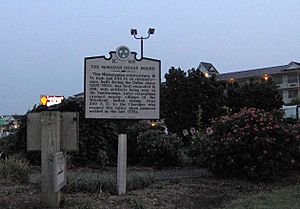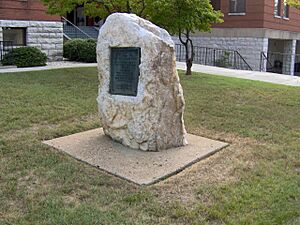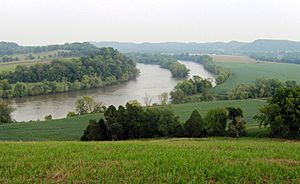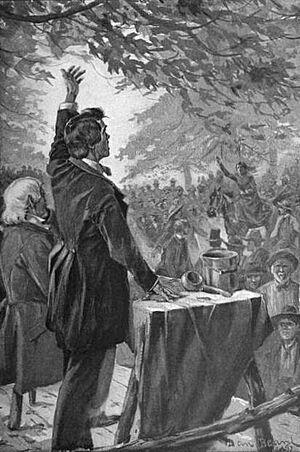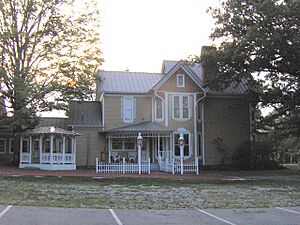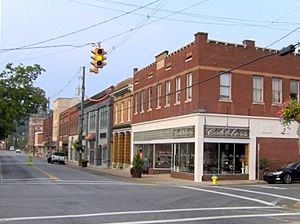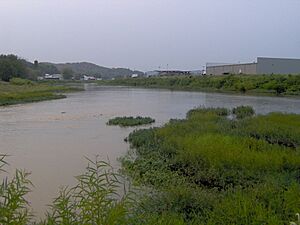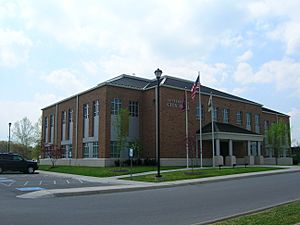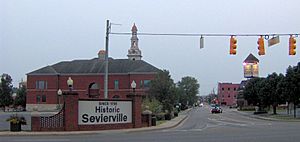Sevierville, Tennessee facts for kids
Quick facts for kids
Sevierville, Tennessee
|
|||
|---|---|---|---|
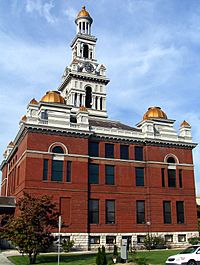
Sevier County Courthouse
|
|||
|
|||
| Motto(s):
"Your Hometown in the Smokies."
|
|||
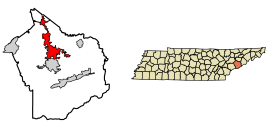
Location of Sevierville in Sevier County, Tennessee.
|
|||
| Country | United States | ||
| State | Tennessee | ||
| County | Sevier | ||
| Founded | 1795 | ||
| Incorporated | 1901 | ||
| Named for | John Sevier | ||
| Government | |||
| • Type | Mayor–council–administrator | ||
| Area | |||
| • Total | 24.25 sq mi (62.80 km2) | ||
| • Land | 24.12 sq mi (62.47 km2) | ||
| • Water | 0.13 sq mi (0.33 km2) 0.50% | ||
| Elevation | 971 ft (296 m) | ||
| Population
(2020)
|
|||
| • Total | 17,889 | ||
| • Density | 741.70/sq mi (286.37/km2) | ||
| Estimate | |||
| Time zone | UTC-5 (EST) | ||
| • Summer (DST) | UTC-4 (EDT) | ||
| ZIP Codes |
37764, 37862, 37864, 37876
|
||
| Area code(s) | 865 | ||
| FIPS code | 47-67120 | ||
| GNIS feature ID | 2405447 | ||
| Website | http://www.seviervilletn.org | ||
Sevierville (pronounced sə-VEER-vil) is a city in eastern Tennessee. It is the main city of Sevier County, Tennessee. In 2020, about 17,889 people lived there.
Contents
History of Sevierville
Long ago, around 200 A.D., Native Americans from the Woodland period were the first people to live in the area that is now Sevierville. They had villages near the Forks-of-the-River area.
Later, between 1200 and 1500 A.D., a group of Native Americans built a large village called McMahan Mound Site. This village had a big mound and was surrounded by a fence. The mound was about 16 feet (5 meters) high. When it was dug up in 1881, people found old tools, pottery, and other items.
By the early 1700s, the Cherokee people controlled much of the land in the Smoky Mountains. Important trails used by the Cherokee crossed through Sevier County. These trails brought the first European traders and settlers to the area.
Early European Settlers
European hunters and traders arrived in the Sevierville area in the mid-1700s. Isaac Thomas was a well-known trader who was respected by the Cherokee. These Europeans mostly traded manufactured goods for animal furs.
As more settlers came to East Tennessee, problems with the Cherokee began. During the American Revolutionary War, the Cherokee sided with the British and attacked settlements. In 1780, John Sevier led an attack against the Cherokee.
In 1783, a peace agreement allowed more European settlers to move into the French Broad valley. People like Hugh Henry and Samuel Newell built small forts. The Cherokee gave up their rights to what is now Sevier County in the 1785 Treaty of Dumplin.
In 1783, Isaac Thomas started a farm and trading post where two rivers met. This area became known as "Forks of the Little Pigeon." A church was built there in 1789. By 1795, the community was growing.
Sevierville Before the Civil War
Sevier County was created in 1794 and named after John Sevier. In 1795, the "Forks-of-the-Little-Pigeon" area was chosen as the county seat and renamed "Sevierville." The first courthouse was built in 1796.
Large farms grew in the area, especially along Boyd's Creek. The Brabson's Ferry Plantation was one of these big farms. Because the French Broad River connected to New Orleans, trading goods by flatboat became popular in the early 1800s.
Roads also helped Sevierville grow. By 1833, the town had about 150 people, including doctors, carpenters, and shop owners. Making whiskey was a common way for people to earn extra money.
In 1856, a big fire destroyed much of downtown Sevierville, including the courthouse and many homes. This fire caused the loss of many important records from the early settlers.
Sevierville During the Civil War
Slavery was not very common in Sevier County. Many people in Sevierville were against slavery. In 1861, only a small number of people in Sevier County voted to leave the Union.
During the American Civil War, Sevierville was a place where many people supported the Union. People who supported the Union were sometimes bothered or threatened.
Because Sevierville was at an important crossroads, both Union and Confederate soldiers often passed through. They would take supplies and cause problems for the town in 1863 and 1864. After the war, some people who had supported the Confederacy had to leave the county.
Sevierville After the War to Today
Sevierville quickly recovered after the Civil War. Many new homes and businesses were built in the 1870s. Two African-American builders, Lewis Buckner and Isaac Dockery, were very important in rebuilding the town. Dockery helped build the new Sevier County Courthouse in 1896.
By the 1880s, Sevierville was growing fast. It had many stores, a sawmill, and hotels. People also started visiting Sevier County for its mountain springs, which were thought to be good for health.
Another fire in 1900 destroyed parts of downtown. Businesses then moved to a new area around Court Avenue. The town officially became a city in 1901.
In 1910, a railroad called the Smoky Mountain Railroad was built, connecting Sevierville to Knoxville. This made travel and trade easier. The railroad ran until 1962.
When the Great Smoky Mountains National Park opened in 1934, many tourists started coming through Sevierville. The city became a popular stop between Knoxville and the park.
Famous entertainer Dolly Parton was born in Sevierville in 1946. Her family had lived in the area for a long time. Sevierville has honored her with a parkway named after her and a statue at the courthouse.
Geography of Sevierville
Sevierville is located where the Little Pigeon River is formed by its East Fork and Middle Fork. This area is known as Forks-of-the-Pigeon. The city is about 10 miles (16 km) north of the Great Smoky Mountains National Park.
Sevierville is in a special spot where the foothills of the Great Smoky Mountains meet the Tennessee Valley. This location has made it a link between Knoxville to the north and the mountain towns to the south.
Several main roads meet in Sevierville. U.S. Route 441, also called "The Parkway," connects Sevierville to Knoxville and the national park. State Route 66 connects the city to Interstate 40.
The city covers about 20 square miles (51.8 square kilometers). Most of this area is land, with a small amount of water.
People of Sevierville
Sevierville is the main city in the Sevierville, Tennessee, area. It is also part of the larger Knoxville-Sevierville-La Follette area.
Population in 2020
| Race | Number | Percentage |
|---|---|---|
| White (non-Hispanic) | 13,017 | 72.77% |
| Black or African American (non-Hispanic) | 262 | 1.46% |
| Native American | 50 | 0.28% |
| Asian | 385 | 2.15% |
| Pacific Islander | 8 | 0.04% |
| Other/Mixed | 700 | 3.91% |
| Hispanic or Latino | 3,467 | 19.38% |
In 2020, there were 17,889 people living in Sevierville. There were 6,026 households and 3,949 families.
Population in 2010
In 2010, Sevierville had 14,807 people. The city had about 613 people per square mile. Most of the people (88.9%) were White. About 10.3% of the population was Hispanic or Latino.
About 24.4% of the people were under 20 years old. The average age was 38.2 years.
The average income for a household in Sevierville was about $37,784. About 23.3% of the population lived below the poverty line.
Economy of Sevierville
Sevierville's economy relies heavily on tourism. This is because of the Great Smoky Mountains National Park. In 2004, nearly half of the businesses in Sevierville were related to tourism.
The city has over 2,000 hotel and motel rooms. These bring in a lot of money from hotel taxes each year. Many cabins are also available for short-term rentals.
Sevierville has local radio stations like WPFT-FM and WWST-FM.
Arts and Culture in Sevierville
Yearly Events
- Bloomin' Barbeque & Bluegrass Festival
- Dumplin Valley Bluegrass Festival
- Corvette Expo
- Sevier County Fair
- Shadrack's Christmas Wonderland
- Sevierville's Annual Christmas Parade
Tourist Attractions
- Burchfiel Grove Memorial Arboretum
- AdventureWorks Climb Zip Swing
- Forbidden Caverns
- Sevier Air Trampoline Park
- Douglas Dam
- Rainforest Adventures Discovery Zoo
- FoxFire Mountain Adventure Park
- Sevier County Heritage Museum
- Tennessee Museum of Aviation
- Scenic Helicopter Tours
- Tennessee Mountain Paintball
- NASCAR Speedpark
- Sky High Air Tours
- Tanger Outlets
- Smoky Mountain Knife Works & National Knife Museum
In the Kodak area of North Sevierville, you can find:
- Great Smokies Flea Market
- Smokies Stadium
Education in Sevierville
Sevierville has public schools run by the Sevier County school system.
- Elementary Schools:
- Sevierville Primary School (Kindergarten-Second Grade)
- Sevierville Intermediate School (Third-Fifth Grade)
- T. Lawson Early Childhood (Pre-Kindergarten-Kindergarten)
- Elementary/Junior High Schools:
- Catons Chapel Elementary School (Kindergarten-Eighth Grade)
- New Center Elementary School (Kindergarten-Eighth Grade)
- Junior High School:
- Sevierville Middle School (Sixth-Eighth Grade)
- Junior High/High Schools:
- Hardin Alternative Learning Center (Seventh-Twelfth Grade)
- Parkway Academy (Sixth-Twelfth Grade)
- High School:
- Sevier County High School (Ninth-Twelfth Grade)
Sevierville also has private schools:
- Riverside Academy (Pre-Kindergarten-Fourth Grade)
- Covenant Christian Academy (Pre-Kindergarten-Twelfth Grade)
- St. Andrew's School (Third-Twelfth Grade)
- New Center Christian School (Ungraded)
For higher education, Sevierville has a campus of Walters State Community College. King University also has a campus there.
Notable People from Sevierville
- Irene Bailey Baker (1901–1994): A former U.S. Representative for Tennessee.
- Reese Bowen Brabson (1817–1863): A former member of the Tennessee House of Representatives and a U.S. Representative.
- Lewis Buckner (1856–1924): A skilled carpenter and furniture maker.
- Kristian Bush (1970–): Half of the country music duo Sugarland.
- Bruce Connatser (1902–1971): Played first base for Major League Baseball's Cleveland Indians.
- Andrew E. Farmer (1979–): A current member of the Tennessee House of Representatives.
- Robert H. Hodsden (1806–1864): A doctor and planter.
- Jason Layman (1973–): Played football for the Houston Oilers in the NFL.
- Roy Hardee "Red" Massey (1890–1954): A Major League Baseball player.
- Zachary D. Massey (1864–1923): A former U.S. Representative and senator.
- The McCarters: A country music trio.
- John Porter McCown (1815–1879): A soldier who fought in the U.S. Army and Confederate Army.
- Richard Montgomery (1946–): A former member of the Tennessee House of Representatives.
- Dolly Parton (1946–): A famous country music star.
- Randy Parton (1953–2021): Dolly Parton's younger brother, a country singer.
- Stella Parton (1949–): Dolly Parton's younger sister, also a country singer.
- Cecil T. Patterson (1930–2002): Introduced the Wadō-ryū style of karate to the Eastern United States.
- Isaac Thomas (1784–1859): An early U.S. Representative for Tennessee.
- Gary R. Wade: A former mayor of Sevierville and a judge.
- Ella Mae Wiggins (1900–1929): A ballad writer and union organizer.
See also
 In Spanish: Sevierville (Tennessee) para niños
In Spanish: Sevierville (Tennessee) para niños
 | Bayard Rustin |
 | Jeannette Carter |
 | Jeremiah A. Brown |






